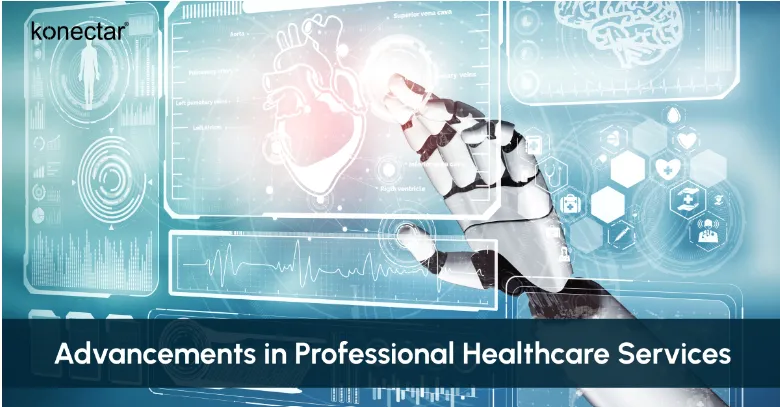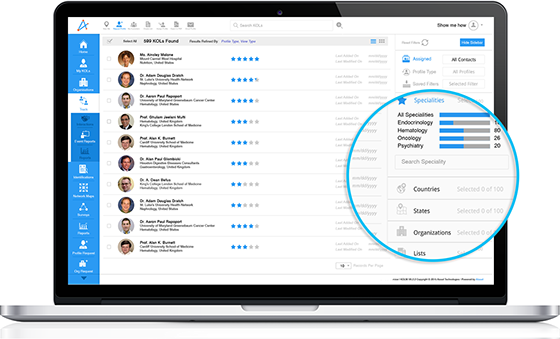23-09-2024
Advancements in Professional Healthcare Services

We are always a part of history in the making without even realizing it. This has never been more true than for the times we live in now. Since the development of AI and machine learning, they have already broken the set molds limited by human constraints. We are on the verge of a technical revolution in professional healthcare services.
Allow us to take you on a tour of the cutting-edge innovations that have been at the forefront of this revolution.
In this article:
- 1. Introducing: Recent Advancements in Professional Healthcare Services
- 2. AI-powered Diagnostics
- 3. How AI is Revolutionizing Radiology by Enhancing Image Analysis and Interpretation
- 4. AI in Personalized Healthcare
- 5. Virtual Health Assistants: Connecting Patients to Information
- 6. AI in Streamlining Administrative Tasks
- 7. Drug Discovery and Development
- 8. Conclusion
- 9. FAQs
Introducing: Recent advancements in Professional Healthcare services
Healthcare is ever-dynamic, with substantial changes making last year's technology obsolete. With the advent of machine learning, much of that process in professional healthcare services is streamlined and transparent, not to mention fast! Next time you book an appointment online for a doctor, you’ll have these technologies to thank.
With that said, let’s see how recent advancements in professional healthcare services can benefit lives all around.
AI-Powered Diagnostics
Early interventions are found to be significantly effective for treatment of neurological diseases like Alzheimer’s. Professional healthcare services are leveraging machine learning algorithms to make early detection possible by analyzing complex data patterns.
Advanced machine learning techniques have proven useful in professional healthcare services, identifying the best parameters for predicting Alzheimer's disease.
Predicting factors of Alzheimer's disease are based on specific parameters that are used in ML (machine learning) models. Some professional healthcare experts believe that using these classifications can help them make a diagnosis, thus prompting early intervention.
As for the effectiveness of such a technique, this proposed approach shows better results with better accuracy on the test data of Alzheimer's disease. This test accuracy score is noticeably more significant than the existing approaches in professional healthcare services.
How AI is Revolutionizing Radiology by Enhancing Image Analysis and Interpretation
Historically, radiology has been a field where trained healthcare professionals virtually assess images for detection and categorization of disease.
An AI-powered and learning-enabled tool can take in thousands of images and create a schema for predicting abnormal growths, then repeat that process billions of times, each time learning from the previous run!
Any AI trained for this purpose will excel at recognizing complex patterns in medical images, providing accurate quantitative assessments that can prompt faster decision-making and quicker action in professional healthcare services.
AI in Personalized Healthcare
No two individuals, in any field of work, are ever treated the same. In fact, we place considerable emphasis on how we are all different from one another and find pride in it. Humans vary widely at the genetic, biochemical, physiological, and behavioral levels. This is especially true with respect to disease processes and treatment responsiveness.
An individual’s practices, personality, lifestyle, and even genetic predisposition all play a vital role in shaping that individual, and logically, they will also determine their unique ailments and how to remedy them.
By analyzing these factors, in addition to their environmental factors, AI algorithms can identify individuals who are at a high risk of developing certain diseases. This early identification allows healthcare professionals to implement preventive measures and interventions, reducing the burden of disease and improving overall population health.
A significant advantage of AI in professional healthcare services is its ability to create a model of an individual's lifetime health trajectory using detailed data points. By considering all determining factors, AI can effectively predict potential future ailments, allowing for appropriate interventions.
Preventive and course correction interventions can do their work, and we can easily avoid or eliminate diseases that are vulnerable to early interventions.
Virtual Health Assistants: Connecting Patients to information
Overpopulation and a need for trained professionals have plagued professional healthcare services for a long time.
Chatbots for information, appointment scheduling, and symptom checking have already started their tenure at several institutions. Although they lack clinical empirical data to prove their efficiency, these tools are already proving their worth and pulling their weight.
In addition, routine or repetitive tasks like symptom assessment, supporting information, medication reminders, and appointment scheduling can provide accurate and up-to-date information around the clock. This allows access to information when healthcare professionals are unavailable or otherwise engaged. There appears to be increased efficacy and user satisfaction when these tools are used.
AI in Streamlining Administrative Tasks
A simple bookkeeping AI can help modernize and automate behind-the-scenes tasks like billing patients, coding medical services for insurance, and keeping patient records updated. This means less paperwork, fewer mistakes, quicker payments, and more time to focus on care of patients.
Reducing staff workload leads to higher job satisfaction; by shifting the responsibility of these manual tasks to AI with far better memory and patience, healthcare professionals can concentrate more on providing personalized patient care.
Drug Discovery and Development
Tech giants are already hard at work creating a centralized and unified AI tool to help us predict via simulation and models how diseases will progress naturally over time. Evolution is the name of the game, and we intend to play for keeps.
In collaboration with professional healthcare services, leading technology companies are developing centralized AI tools to predict how diseases will progress over time using sophisticated simulations and models. These advancements are aimed at enhancing the scientific method and accelerating drug discovery.
Another application of AI in healthcare pertains to drug repurposing. Drug repurposing is using an existing drug for a new treatment that was not indicated before. During the COVID-19 crisis, there was an urgent need to find treatment drugs that could manage the virus's various effects on the human body. Healthcare professionals were quick to explore using existing drugs and their therapeutic uses to combat the pandemic.
The vast amount of data involved in drug repurposing makes it challenging to be a human-led task. Drug repurposing involves identifying the drug, evaluating its efficiency using preclinical models, and proceeding to phase II clinical trials. Healthcare experts use AI algorithms to identify the interaction between drugs and protein targets.
What’s more fascinating is that any such model can utilize existing genetic data, clinical trial data, and molecular structure pathways to conclude which drug can be repurposed effectively.
Conclusion
In closing, AI is a vital resource we can’t afford to pass up on. With an ever-increasing population, increasing diversity, and a variety of demands, AI can help close the gaps between skill and need that have been expanding recently.
Integrating AI into professional healthcare services is transforming the industry by enhancing the ways healthcare professionals are diagnosing and prescribing medicines. Virtual assistants will assist in improving patient information and engagement, and much more.
These are only some applications in which AI is already surpassing manual labor. Technology like virtual reality, augmented reality, 3D printing organs, and cloning are some of the experimental techniques in development.
Bioprinting is already being discussed as an alternative to natural organ transplants; it remains to be seen how the scientific community will arrive at a universal agreement.
Hopefully, this information has provided valuable insights into the advancements in professional healthcare services. Staying informed about these developments is essential. We’ll be sure to keep our eyes on it to bring you the recent advancements in professional healthcare, so be sure to check this space often.
FAQs
- What is the role of AI in early disease detection?
AI helps in analyzing complex data patterns, making early detection of diseases like Alzheimer’s possible. This allows for timely interventions and improved patient outcomes.
- How is AI changing radiology?
Trained AI tools can analyze thousands of medical images, learning from each case to detect abnormalities faster and more accurately than manual methods.
- What is personalized medicine, and what is the role of AI in it?
Personalized medicine tailors treatment to individual patients based on their unique genetic makeup, lifestyle, and environment. AI assists by analyzing data to predict disease risks and outcomes.
- How does AI assist in drug discovery and development?
AI accelerates drug discovery by using predictive models and simulations to understand disease progression.
- What is the next big thing in healthcare?
In addition to AI, technologies like virtual reality, 3D bioprinting, and cloning are being explored. AI will continue to be critical in improving patient care and medical research.





